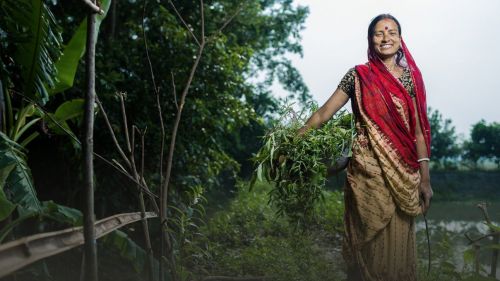Feed the Future Grows Food Security through Innovation and Collaboration

Just over ten years ago, the world was shaken not by a pandemic but by skyrocketing food prices.
The COVID-19 pandemic has shed light on dark truths about our food system: it is brittle, and too often farmers and hungry people lose when the system is under pressure. The number of people experiencing acute hunger is set to double and farmers in the US and around the world are struggling. Yet as dire as the situation is, we already have powerful mechanisms for changing our global food system from fragile to resilient. Feed the Future, the United States Agency for International Development’s (USAID) flagship food security initiative, has cultivated hope around the world for a decade.
Just over ten years ago, the world was shaken not by a pandemic but by skyrocketing food prices. This sparked riots and fueled civil and political instability, as people were unable to feed their families. The resulting crisis spurred the Chicago Council’s Distinguished Fellows Catherine Bertini and Doug Bereuter to write a white paper urging the US to reinvest in international agricultural development and agriculture research. Feed the Future was born shortly thereafter and has supported global food security ever since.
As the initiative grew into a program, it built critical connections with US institutions to bring American knowledge and technology to bear on some of the most intractable global problems such as hunger and malnutrition. Twenty Innovation Labs are a crucial facet of Feed the Future’s work. The Innovation Labs are based at US land-grant universities and conduct important agricultural research to advance global food security. They are continuing the legacy of the institutions which built our national agricultural production of key crops like soy and corn. Innovation Labs develop farming solutions that are useful both for smallholders around the world and US farmers. These world-class farmers are working to change how the world grows food through innovation, collaboration, and a systems approach.
The Feed the Future Innovation Labs collaborate with the CGIAR (formerly the Consultative Group for International Agriculture Research) on projects that work with communities, National Agriculture Research Institutes, and local universities across South and Southeast Asia and Africa. By taking a "bottom-up" approach, rather than top-down, researchers are empowering people to raise themselves up out of poverty and hunger. For example, the Soybean Innovation Lab at the University of Illinois created a competition in three US and Ghanaian universities to create a more user-friendly multi-crop thresher that village blacksmiths can easily fabricate. Locally-appropriate, locally-generated solutions build up local economies and can be sustained long after researchers return to the US. As these local economies around the world grow, so too grow future markets for US producers. In order to craft these sustainable, long-term solutions, researchers must take time to understand local communities and use an approach that recognizes agriculture and food as a series of interconnected industries—from farmer to logistics to markets to trade. Researchers need to take a systems approach to building a better, more fruitful food supply chain.
Systems thinking, the idea of considering a given issue as part of a larger interconnected network, is behind much of the work FTF Innovation Labs and their partners are doing. Systems thinking requires examination of local value chains and food systems to discover the exact point at which an intervention would be most effective. One such example is a crop seeder developed for farmers in India that addresses the problems of water scarcity, soil health, and air pollution all at once. On the micro-scale, researchers are looking at the genome of chickens indigenous to the African continent to pinpoint disease resistance. On the macro scale, systems thinking highlights that those that facilitate innovation and build partnerships to tackle food insecurity are just as important as scientists in the lab.
In fact, a systems approach underpins the concept of resilience, which has grown in prominence in the agricultural development community. This is especially true at the United States Agency for International Development, which—as funders of FTF Innovation Labs—defines as “the ability of people, households, communities, countries and systems to mitigate, adapt to, and recover from shocks and stresses in a manner that reduces chronic vulnerability and facilitates inclusive growth.” Investing in resilience means that a shock, such as drought, flood, or pandemic, doesn’t turn into a crisis. It is as much about food safety and reducing losses as it is about increasing production. It means finding creative methods for pest management, searching for underutilized indigenous plants, and thinking years ahead. In resilient rural communities, families are better able to invest in improvements to their agricultural production, creating a spiral of upward mobility.
Fostering this kind of prosperity has long-term benefits not only for those communities, but for US producers and consumers as well. We are building future trade partners and investing in a more peaceful, healthy world. Not only that, but a systems approach to resilience and innovation will strengthen our domestic food system just as much as the global food system. As the COVID-19 pandemic has shown, our domestic food production is deeply connected to and reliant on international systems. Agriculture R&D is vital to the health of those systems. The work of the Feed the Future Innovation Labs may not seem flashy, but it is the unsung engine that will keep our food system running for generations to come.

